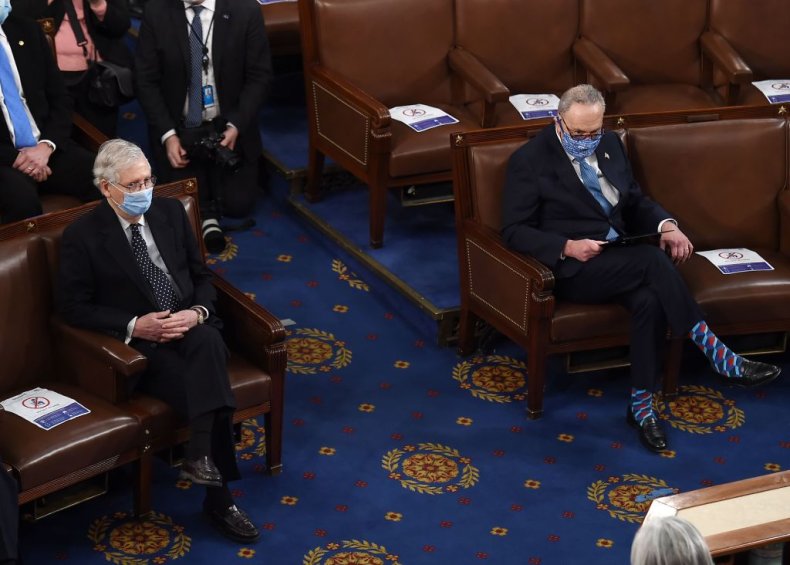[ad_1]
Some Democrats are pushing for abolishing the Senate’s filibuster rule. Meanwhile, GOP Senate Minority Leader Mitch McConnell has demanded that Senate Democrats promise not to challenge the legislative rule in their organizing resolution to govern how the upper chamber of Congress will carry out its duties under Democratic Senate Majority Leader Chuck Schumer’s leadership.
The filibuster, in its current form, requires at least 60 members of the Senate to vote to end debate on many matters before they can proceed to another vote. Historically the filibuster was not readily used to block the passage of legislation, but that has changed in the past few decades. According to a 2020 Brookings Institution report, more filibuster cloture motions have been filed in the past two decades than in the preceding 80 years. (Cloture is the closing of debate.) Many analysts see this as a key reason behind constant partisan deadlock in Congress.
“The filibuster actually originated by accident,” Rogers Smith, a professor of political science at the University of Pennsylvania, told Newsweek in a Thursday email. “In the early 19th century, the Senate simplified its rules and dropped one that allowed for closing debate without realizing the implications.
“Filibusters were rare, however, until the late 19th century, when the Republicans were most often the dominant party, and Democrats especially found they could block laws they didn’t like by using filibusters to prevent anything else getting done until their opponents gave up,” Smith said.
The professor pointed out that senators—both Republicans and Democrats—have made changes and “chipped away” at the filibuster

OLIVIER DOULIERY/POOL/AFP/Getty
“More recently, the Senate Democrats in 2013 repealed the 60-vote cloture requirement for federal district court and circuit court judicial appointments and some executive branch positions,” Smith said. “In 2017, the Senate Republicans repealed the 60-vote cloture requirement for Supreme Court appointments, aiding Donald Trump’s appointment of three Supreme Court justices after the Republicans had blocked Barack Obama’s nomination of Merrick Garland.”
Smith said that many people now believe it’s time for the filibuster to “go completely.”
While Senate Republicans may have been willing to make changes when it benefited them, they are opposed to doing so now, with Democrats controlling the House, Senate and the White House. But with a 50-50 split between Republicans and Democrats in the Senate, Democrats only narrowly have the upper hand. When a vote is tied, Vice President Kamala Harris, as president of the Senate, will cast the deciding vote—giving her party slim control of the chamber.
“I cannot imagine the Democratic leader would rather hold up the power-sharing agreement than simply reaffirm that his side won’t be breaking this standing rule of the Senate,” McConnell said in a floor speech on Thursday. “I appreciate our ongoing good-faith discussions and look forward to finding the solution together.”
It’s unclear how far Senate Democrats are willing to go in changing the legislative rules in their favor. But some progressives are urging their colleagues to bring an end to the filibuster.
“Abolish the filibuster,” Representative Ilhan Omar, a Minnesota Democrat who serves as the whip of the Progressive Caucus, tweeted on Thursday.
Senator Ed Markey, a Massachusetts Democrat, shared the same sentiment in a Thursday interview with CNN. Markey then reiterated his position on Twitter, writing, “We should eliminate the filibuster.”
Smith said, “Because the Democrats have the narrowest possible majority in the Senate, and they have a very ambitious legislative agenda that the Democratically controlled House is likely to support, abolishing the filibuster would make it far more likely that they would get major bills passed. They would still face difficulties, since centrist Democrats might object to some bills, progressives to others. But their path would be much easier.”
However, Smith cautioned that removing the filibuster could come with political risks as well. He pointed out that it would benefit the Democrats while they are in power, but, conversely, it would make it harder to block Republican initiatives if they lose power.
“Many Democrats are far less concerned about that now, though. Their priority is to get laws enacted that can have visible success in combatting the pandemic, its economic harms and much more,” Smith said.
[ad_2]
Source link